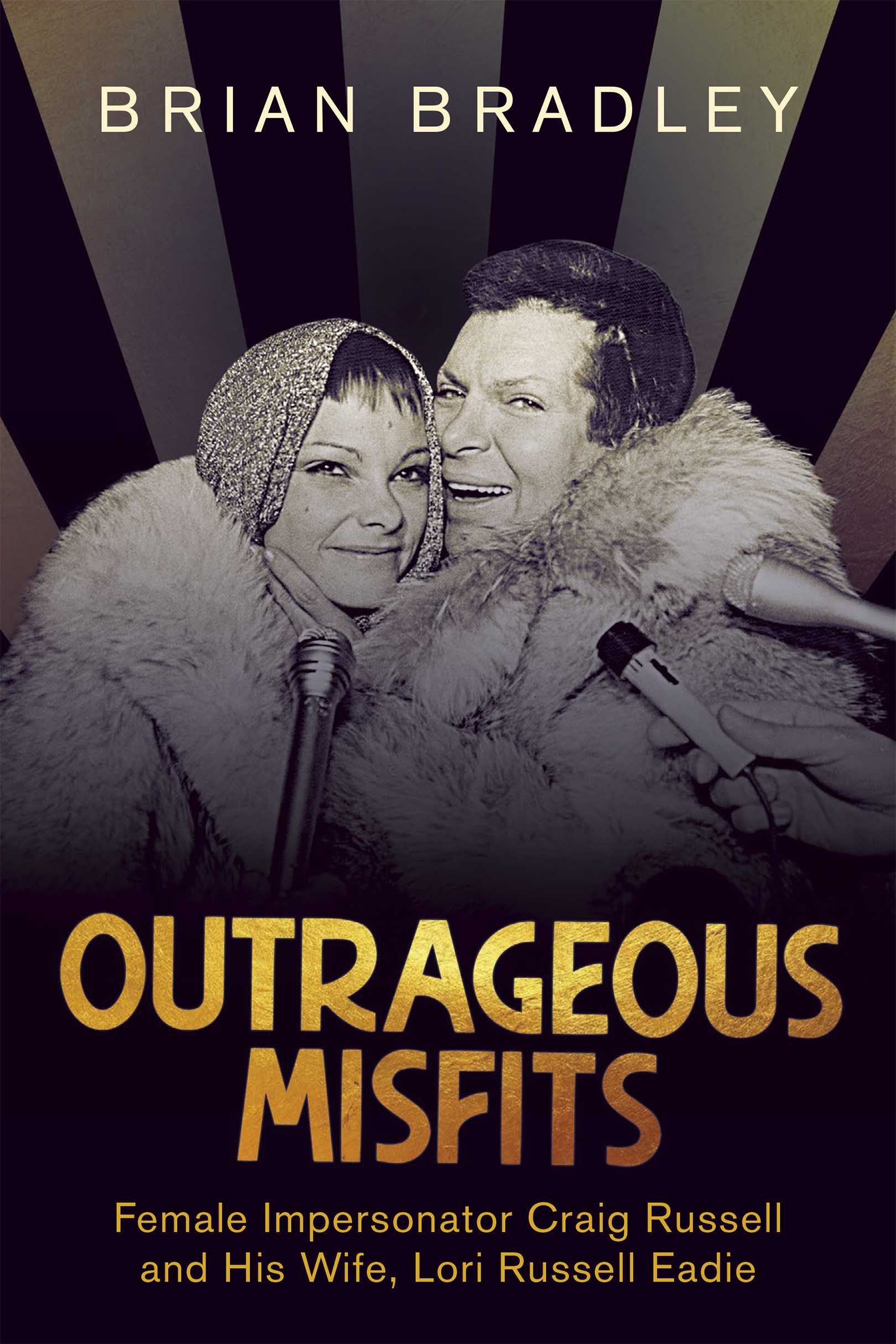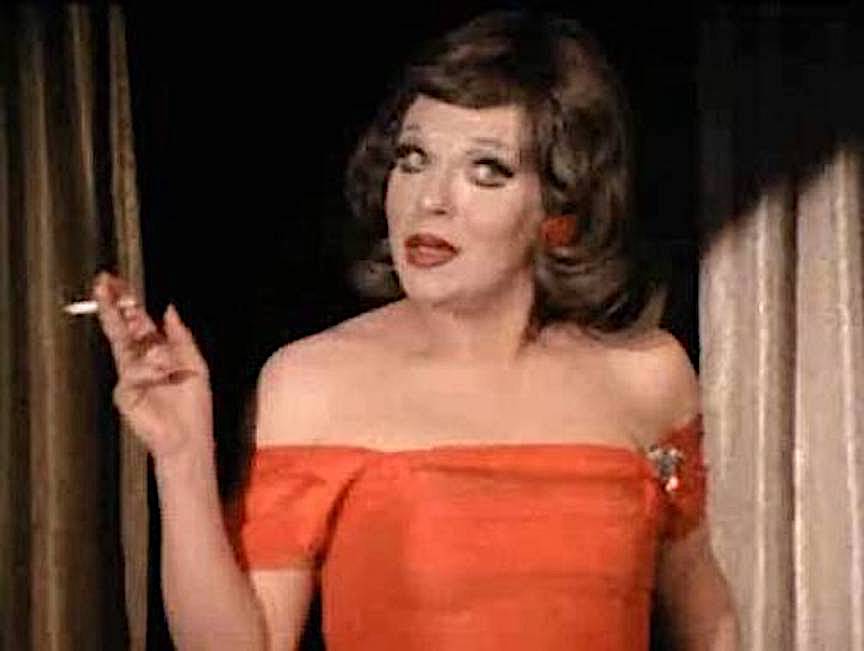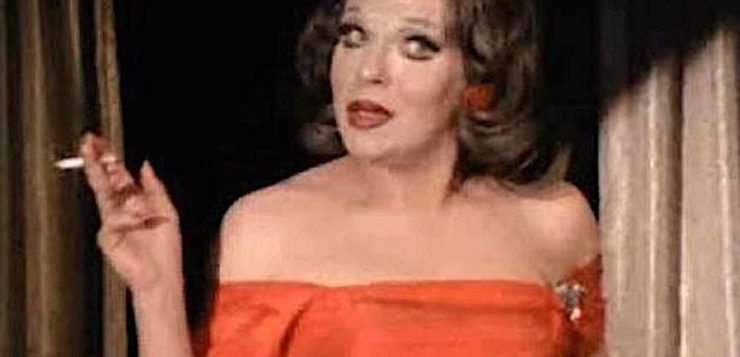 OUTRAGEOUS MISFITS
OUTRAGEOUS MISFITS
Female Impersonator Craig Russell and His Wife, Lori Russell Eadie
by Brian Bradley
Dundurn. 360 pages, $22.99
OUTRAGEOUS! was a popular and critically acclaimed 1977 movie starring female impressionist Craig Russell, who went on to win the Silver Bear for Best Actor at the Berlin Film Festival. The plot was derived in part from a story in Russell’s friend and one-time roommate Margaret Gibson’s 1980 collection The Butterfly Ward. In the movie we go from Russell working as a hairdresser in Toronto to a hit performance in a gay club in New York’s Meatpacking District. (This was many decades before that neighborhood’s gentrification.) Woven into the plot is Russell’s close friendship with his young schizophrenic friend Liza.
Craig Russell was born in Toronto in 1948 as Russell Craig Eadie and was adopted at birth by a childless couple. His adoptive father was actually his biological uncle. Intrigued from his earliest years by women’s clothes and jewelry, Craig was championed by his grandmother, supported—at least until adulthood—by his mother, and reviled by his father. He was “fascinated by femininity, and strong women appealed to him,” and he believed that “feminine strength” was more enduring and reliable than its male counterpart. He went to California for several months in 1967 for his dream job: working for Mae West, who was about 74 at the time. More than idolizing her, he was obsessed with her and organized her Canadian fan club, of which he was the only member. He’d seen her 1930s movies, caught her TV appearances, and immediately felt that he had to know her. He was quoted as saying that she was like “a truck driver in drag, with something enchanting about her.” West taught him everything he needed to know to start his stage career. He answered her mail, surreptitiously tried on her outfits, and explored L.A.’s gay scene.

Lori Jenkins—whose life story is told in alternating chapters—was born into a wildly dysfunctional family, with a mother who abused her severely and frequently. She found shelter in her high school drama club, where she heard about Craig Russell after he’d become a star in Outrageous! She pursued him doggedly (as she did other stars she was interested in), and they eventually met. Craig hired her as his assistant, and she was an apt student, eventually becoming his dresser and finally his wife. To say that their marriage was tumultuous would be an understatement. Craig liked to self-medicate with a regime of cocaine, alcohol, and whatever street drugs were on offer. Lori had to support herself, and often had to support her husband, too. She worked backstage in Toronto theaters, where she was hailed by many actors for her meticulous and caring approach, but denounced by a few others for her quirky personality.
 From today’s vantage point, one might say that both Craig Russell, who died of complications of AIDS in 1990, and Lori, who died of cancer in 2008, were pansexual. Craig had liaisons with both men and women and had a daughter (from a fling in the early 1970s) with whom he became close near the end of his life. Many people assumed Lori was a lesbian, though she did not speak about her sexual orientation. Outrageous Misfits is also the story of Toronto’s gay scene from the 1970s to the present day. Brian Bradley, a Canadian journalist and writer for The Toronto Star, carried out extensive archival research, had access to journals and other primary sources, and inter- viewed key family members, friends, and associates. This leads to some repetition, but for the most part the narrative presses on relentlessly, from the highest highs to the lowest lows. The book’s many evocative black-and-white photos are a bonus.
From today’s vantage point, one might say that both Craig Russell, who died of complications of AIDS in 1990, and Lori, who died of cancer in 2008, were pansexual. Craig had liaisons with both men and women and had a daughter (from a fling in the early 1970s) with whom he became close near the end of his life. Many people assumed Lori was a lesbian, though she did not speak about her sexual orientation. Outrageous Misfits is also the story of Toronto’s gay scene from the 1970s to the present day. Brian Bradley, a Canadian journalist and writer for The Toronto Star, carried out extensive archival research, had access to journals and other primary sources, and inter- viewed key family members, friends, and associates. This leads to some repetition, but for the most part the narrative presses on relentlessly, from the highest highs to the lowest lows. The book’s many evocative black-and-white photos are a bonus.
Canadian lyricist Barbara Hoffert wrote and performed the last song in the Outrageous! soundtrack, titled “It Ain’t Easy,” with the last lines: “It ain’t easy in this crazy world/ I could never make it without you/ We love each other in our crazy way./ Who knows when they’ll come and take us away?/ I hope not today/ Feeling so gay.”
Martha E. Stone is the literary editor of this magazine.






